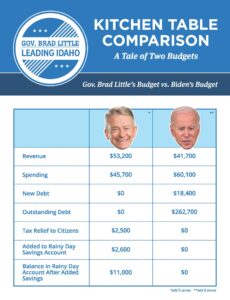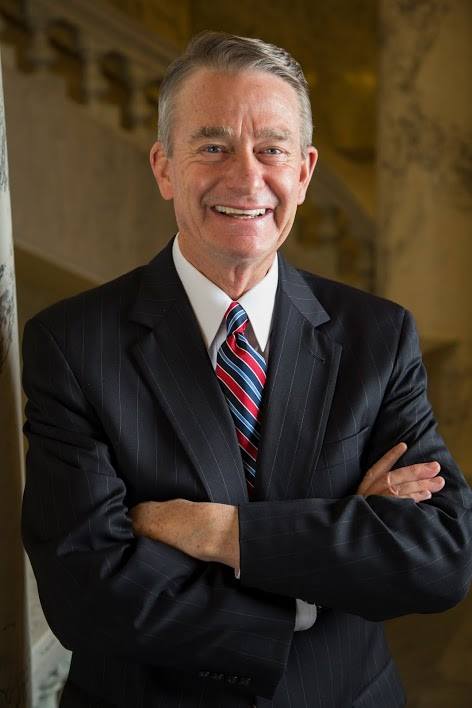Gov. Little makes a big deal about budget balancing differences. Does it matter?
By Eric Valentine
 Hey @Idahoans … Check out your governor’s Insta. He’s totally dissing the president. #Bidenflation.
Hey @Idahoans … Check out your governor’s Insta. He’s totally dissing the president. #Bidenflation.
Politicians—especially ones whose seats are being challenged within their own party—are supposed to play to their base whenever they have the opportunity. And given a Democratic stronghold on the Oval Office for at least a few more years, plus midterm elections fast approaching, plus the painful impact of current inflation, Idaho Governor Brad Little should be using social media and more to showcase his proposed balanced budget. But with a Friday, Feb. 18, budget setting session for FY2023 only a few weeks away, some fiscal policy conversations may sound freaky. That is, Republicans and Democrats may be switching up slogans or even finding a few things they actually agree—or can compromise—on.
Case in point: In a January “Newsweek” article, Republican and Idaho’s Senate President Chuck Winder was quoted as saying, “It’s interesting that some of the public is saying, ‘No, I don’t really want tax relief. I’d rather see you put the money into roads and schools and do the deferred maintenance things that need to be done to keep our state and our universities and colleges running properly.’ So that’s going to be the debate—how best to do that.”
In a state that is firmly implanted in the political red, Winder’s use of the phrase “some of the public” means Republicans—or the people who are going to vote for Winder—are OK with no tax relief on their personal IRS checks if it means the road they drive on or the teacher who educates their kid is a little better off.
And as much as Idaho has going for it, there are a lot of improvements to be made. Research and surveys rate Idaho with less than stellar national comparison rankings. For instance, regarding Idaho, recent “U.S. News & World Report” rankings say Idaho is:
• Number 26 in healthcare
• Number 28 in transportation
• Number 29 in infrastructure
• Number 33 in education
• Number 35 in opportunity
• Number 41 in access to the internet
And most eyebrow raising of all, the Gem State ranks below New Jersey in the category of natural environment. The number 15 ranking is negatively influenced by Idaho’s poor showing when it comes to drinking water violations (more on that later), but still, the following is not something you’re going to see bragged about by the Visitors Bureau any time soon: Idaho Water Quality—Hey, at least we’re not in Flint, Michigan!
Government—A Socialist Enterprise
In a country whose roots are tied to capitalism perhaps even more so than the other c-word (Christianity), it’s become customary and expected to be hawkish about things like deficits and debts (yes, there is a difference between the two), fiduciary responsibility, tax breaks for the working class (well, for billionaires and corporations and any so-called job creator, too). And it’s fair to say the national narrative—historically, at least—is that Democrats are the tax-and-spend party and Republicans are the adult-in-the-room party.
In more local jurisdictions, where often someone’s D or R political affiliation is not or is at least less publicly known, leaders there are starting to focus more on “investment” versus “spending.” Case in point: Ketchum Mayor Neil Bradshaw’s take on his city’s yearly budget aims.
“The law requires us to keep a reserve fund and when there’s something left over we want to put that money to work, because that’s what government should be doing,” Bradshaw said. “I don’t believe the taxpayers want us to be a bank.”
And therein lies the debate Bradshaw hopes governments (and voters) at any jurisdictional level start clearly having: a fiscal analysis of what is and what is not an investment or which investment should be priority any given year.
“What we don’t want to be is frivolous. If we’re putting taxpayer money into a slip and slide on Mt. Baldy in the middle of a housing crisis, that’s frivolous,” Bradshaw said.
Editor’s Note: To follow the Idaho State Legislature’s budget-setting process, download or link to the schedule at legislature.idaho.gov/lso/bpa/process



